The Balance Between Sleep, Nutrition, and Supplementation for Busy People
Introduction
In today’s world of constant notifications, tight schedules, and high expectations, most people feel like they’re running on fumes. You sleep less, eat on the go, and hope that your morning coffee will somehow fill the gaps. ☕💼
But here’s the truth: your brain and body operate on synergy. Sleep, nutrition, and supplementation are deeply connected — and when one falls out of balance, the others suffer.
For busy people, optimizing these three pillars isn’t about perfection — it’s about creating sustainable habits that keep your mind sharp, mood stable, and energy steady. 🧠⚡
Let’s explore how to restore that balance — through smarter rest, better nutrition, and strategic supplementation that fits your lifestyle.
Looking for supplements for Brain Fog? Click here.
💤 Why Sleep Is the Foundation of Peak Performance
Sleep isn’t “downtime” — it’s active brain recovery.
While you sleep, your body repairs tissues, balances hormones, and consolidates memories. Without enough of it, no amount of caffeine or supplements can fully restore your mental edge.
🧬 What Happens During Deep Sleep
🧠 Memory consolidation: The brain organizes new information.
💪 Muscle recovery: Growth hormone peaks.
⚡ Energy reset: Mitochondria repair themselves.
🧹 Detoxification: The glymphatic system flushes out brain toxins.
When you consistently miss sleep, stress hormones like cortisol rise — disrupting appetite, mood, and focus.
💭 Think of sleep as your nightly software update — skip it, and you’ll glitch the next day.
🕓 How Much Sleep Do Busy People Really Need?
The standard 7–9 hours isn’t a luxury; it’s biological maintenance.
But for people juggling careers, families, and side hustles, quantity isn’t the only factor — quality matters even more.
Signs You’re Sleep-Deprived (Even if You “Sleep Enough”):
Relying on multiple cups of coffee ☕
Brain fog or slow recall
Irritability or emotional sensitivity
Sugar cravings or late-night snacking
Waking up tired
If that sounds familiar, you’re not lazy — your nervous system is overworked and your sleep cycle is misaligned.
🌙 The Sleep–Nutrition Connection
What you eat directly affects how well you sleep — and vice versa.
🥦 Nutrition Impacts Sleep by:
Regulating hormones like melatonin and serotonin.
Stabilizing blood sugar, preventing nighttime awakenings.
Providing amino acids (like tryptophan) for neurotransmitter balance.
Poor diet = poor sleep → more cravings → worse nutrition.
It’s a vicious cycle.
🍽️ Nutrition Habits That Support Rest and Focus
Busy schedules make eating well feel impossible, but consistency matters more than perfection.
🥗 Build Every Meal Around These 3 Rules:
Protein first → Supports neurotransmitters and reduces sugar crashes.
Fiber and healthy fats → Slow digestion for stable energy.
Micronutrients → Colorful vegetables and fruits nourish mitochondria.
🌞 Morning Tips:
Eat a protein-rich breakfast (eggs, Greek yogurt, or smoothie with whey protein).
Avoid skipping meals — it spikes cortisol and worsens focus.
🌙 Evening Tips:
Include magnesium-rich foods (spinach, avocado, almonds).
Avoid heavy, spicy meals close to bedtime.
Limit alcohol — it fragments REM sleep even if it helps you “fall asleep.”
🧠 A nourished brain is a calm brain — and calmness invites deep rest.
⚡ Supplements That Help Busy People Maintain Balance
When life gets hectic, even a clean diet can’t cover everything. Supplements bridge the gap — especially when stress, travel, or deadlines make it hard to eat and rest well.
Let’s look at the top nutrients for restoring your sleep–nutrition–energy triangle.
🌿 Magnesium (Especially L-Threonate or Glycinate)
Magnesium supports over 300 enzymatic reactions, including muscle relaxation, nerve balance, and melatonin production.
Benefits:
Improves sleep quality
Reduces anxiety and tension
Supports brain plasticity and focus
Dosage: 200–400 mg in the evening.
💤 Your nightly chill-pill for both mind and body.
☀️ Vitamin D3 + K2
Low vitamin D is linked to fatigue, poor mood, and insomnia.
It also helps regulate circadian rhythm and supports brain function.
Dosage: 2000–5000 IU daily (with fat-containing meals).
🌞 Morning sunlight + Vitamin D = a reset for your internal clock.
🧠 Omega-3 Fatty Acids (DHA + EPA)
Your brain is 60% fat, and DHA is its primary building block.
Benefits:
Enhances mental clarity
Reduces inflammation and anxiety
Supports sleep by balancing serotonin
Dosage: 1000–2000 mg/day.
🐟 Feed your neurons what they’re literally made of.
⚙️ B-Complex Vitamins
The B-family supports energy metabolism and neurotransmitter function.
Benefits:
Boosts alertness and motivation
Helps convert food into energy
Balances mood under stress
Dosage: 1 capsule daily (preferably in the morning).
🌿 Your natural productivity fuel.
💤 L-Theanine
An amino acid from green tea that increases alpha brain waves — the state of calm focus.
Benefits:
Promotes relaxation without drowsiness
Enhances sleep quality
Works synergistically with caffeine for smooth focus
Dosage: 200 mg (day or evening).
☕ Turns your coffee into calm concentration instead of chaos.
🧩 Adaptogens (Rhodiola, Ashwagandha, or Holy Basil)
Adaptogens balance stress hormones and improve resilience.
Benefits:
Reduces cortisol
Increases stamina and cognitive endurance
Supports better sleep recovery
Dosage: 300–500 mg/day.
🌺 Adaptogens teach your body how to stay calm — no matter what’s happening.
Looking for supplements for Brain Fog? Click here.
🧘 The Missing Link: Stress Management

You can take the best supplements, eat clean, and track your sleep — but if you’re constantly in “fight or flight” mode, your system won’t recover.
High stress disrupts digestion, nutrient absorption, and melatonin production.
The antidote? Breathwork and therapy.
🌬️ Breathwork: The Fastest Way to Reset
You can’t always nap during a workday — but you can breathe differently. 🌬️
Try the “4-7-8 Reset”:
Inhale through your nose for 4 seconds
Hold for 7 seconds
Exhale slowly through your mouth for 8 seconds
Repeat 3–5 times
Benefits:
Lowers heart rate
Reduces cortisol
Improves oxygen flow to the brain
Do this before bed or during a midday slump. It’s a quick way to shift from stress to calm clarity.
✨ Your breath is your built-in supplement for peace.
Want to try Breathwork? Click Here.
💭 Therapy: The Mind’s Maintenance Routine
Just as your body needs nutrients, your mind needs emotional care.
Chronic stress often shows up as insomnia, fatigue, or overeating — not just mood changes. Therapy helps you identify and address those root patterns.
How Therapy Supports Balance:
🧘 Reduces mental clutter
💬 Teaches emotional regulation
💭 Improves focus and self-awareness
💤 Helps unwind before bed
Therapy also pairs beautifully with adaptogens and magnesium, both of which enhance relaxation and emotional stability.
Looking for online therapy ? Click Here.
🧬 The Role of Circadian Rhythm
Your body runs on a biological clock, and every system — from digestion to hormone production — depends on it.
🔄 How to Reset Your Internal Rhythm:
🌞 Morning sunlight within 30 minutes of waking
☕ Caffeine only before noon
🍽️ Regular meal timing
🌙 Avoid blue light 1–2 hours before bed
Even small changes (like consistent wake times) help balance energy, appetite, and focus.
🍵 Sample Daily Routine for Busy People
Here’s a simple, realistic schedule to integrate sleep, nutrition, and supplementation into your day — without needing to overhaul your life.
| Time | Habit | Why It Works |
|---|---|---|
| ☀️ 7:00 AM | Drink water + sunlight + Omega-3 + B-complex | Hydrates, boosts energy, resets circadian rhythm |
| ☕ 8:00 AM | Coffee + L-Theanine | Smooth, calm alertness |
| 🥗 12:30 PM | Balanced lunch (protein, fat, fiber) | Stabilizes blood sugar |
| 🌬️ 3:00 PM | 4-7-8 breathing or short walk | Beats the afternoon slump |
| 🧘 6:00 PM | Adaptogen or light therapy session | Stress reduction |
| 🍽️ 7:30 PM | Light dinner with magnesium-rich foods | Prepares body for rest |
| 🌙 9:30 PM | Magnesium supplement + journaling | Mind-body wind-down |
| 🛏️ 10:30 PM | Sleep | Deep recovery & brain detox |
⚙️ Consistency beats intensity — small routines create sustainable sharpness.
🧠 How to Know You’re in Balance
You’ll know your lifestyle is syncing when:
✅ You wake up refreshed instead of groggy.
✅ You can focus for hours without caffeine crashes.
✅ You fall asleep easily and wake naturally.
✅ Your energy stays steady throughout the day.
Balance feels like clarity + calmness coexisting.
⚠️ Common Mistakes Busy People Make
🚫 Using caffeine to replace sleep.
Caffeine masks fatigue; it doesn’t fix it.
🚫 Skipping meals.
Low blood sugar equals poor focus and irritability.
🚫 Over-supplementing.
More isn’t better — start with the essentials.
🚫 Ignoring mental rest.
Even high performers need downtime.
💡 Think of balance as managing your internal energy economy — not chasing constant productivity.
🧩 The Science of Balance
Your nervous system has two modes:
Sympathetic (fight or flight) — alert, stressed, or overworked.
Parasympathetic (rest and digest) — calm, focused, restorative.
Busy lifestyles lock you in the first mode.
Sleep, nutrition, and proper supplementation shift you into the second — allowing your mind to recover faster and perform better.
🌿 The goal isn’t to eliminate stress — it’s to recover smarter from it.
🌙 Supplements to Avoid Before Bed
Even healthy supplements can interfere with sleep timing. Avoid taking these at night:
B-complex (energizing)
Caffeine or green tea extract
Ginseng
Creatine (mildly stimulating)
Stick with calming compounds like magnesium, L-theanine, glycine, or ashwagandha.
💬 Mindset: Redefining “Productivity”

For many busy people, rest feels like wasted time. But neuroscience says the opposite: your most creative, focused moments happen after recovery.
When you’re rested and nourished, your prefrontal cortex (decision-making center) works efficiently — meaning you’ll do more in less time.
🧠 You don’t need more hours — you need better energy management.
🌟 Final Thoughts
Balancing sleep, nutrition, and supplementation isn’t about perfection — it’s about consistency.
When you start sleeping deeply, nourishing wisely, and supplementing intentionally, your energy becomes predictable, your mood stable, and your thinking crystal clear.
For busy people, this isn’t luxury — it’s strategy.
Because the real secret to high performance isn’t working harder…
…it’s recovering smarter. 🌙🧠✨
📚 References
Walker M. Why We Sleep. Scribner, 2017.
Kennedy DO. “Nutritional nootropics and brain performance.” Nutrients. 2016;8(11):1–25.
Yurko-Mauro K, et al. “DHA and cognition.” Alzheimers Dement. 2010;6(6):456–464.
Streeter CC, et al. “Breathwork and autonomic regulation.” J Altern Complement Med. 2012;18(5):402–412.
Panossian A, Wikman G. “Adaptogens and stress resistance.” Pharmaceuticals. 2010;3(1):188–224.
Related Posts
-
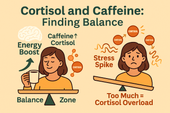
Cortisol and Caffeine: How Much Is Too Much?
Caffeine can boost energy and focus — but too much can overstimulate your stress hormones. ☕ Learn how caffeine affects cortisol, energy levels, and mood, and discover how to find the perfect balance for lasting calm and clarity. 🌿
-
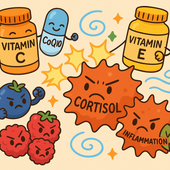
Antioxidants for Stress Management and Cortisol Control
When stress overwhelms your body, antioxidants come to the rescue. 🌿 Learn how vitamin C, CoQ10, and other natural compounds help reduce oxidative stress, regulate cortisol, and restore calm energy from within. ✨
-
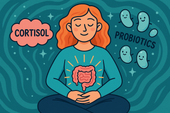
Cortisol and Gut Health: How Probiotics May Help
Chronic stress doesn’t just affect your mind — it changes your gut. 🌿 Learn how cortisol disrupts the microbiome and how probiotics can help restore balance, improve digestion, and calm your stress response naturally. ✨
-

Vitamin D and Cortisol: Supporting Immune Balance
Vitamin D does more than strengthen bones — it helps regulate cortisol and support immune balance. 🌞 Learn how this essential hormone-like nutrient restores calm, improves mood, and strengthens your body’s natural stress defenses. 🌿
-
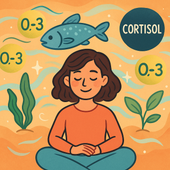
Omega-3s and Cortisol: Fighting Inflammation Naturally
Omega-3s are more than heart-healthy fats — they’re natural cortisol regulators. 🌿 Learn how EPA and DHA help reduce chronic inflammation, calm the nervous system, and support stress recovery from the inside out. ✨
-
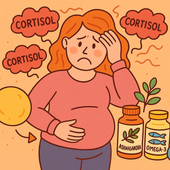
High Cortisol and Belly Fat: Can Supplements Help?
Chronic stress can make belly fat harder to lose — but supplements like ashwagandha, magnesium, and omega-3s may help restore cortisol balance. 🌿 Learn how science-backed nutrients support fat metabolism, calm your stress response, and bring your body back into harmony. ✨
-
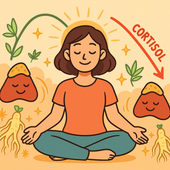
How Ginseng Can Support Energy and Cortisol Balance
Ginseng is one of nature’s most powerful adaptogens, helping your body handle stress without burning out. 🌿 Learn how this ancient root supports balanced cortisol, steady energy, and sharper focus — restoring vitality naturally and sustainably. ✨
-
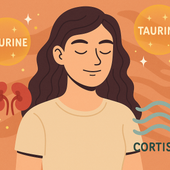
Taurine and Cortisol: Supporting Focus Under Stress
When cortisol surges, focus fades — but taurine helps restore balance. 🌿 Learn how this powerful amino acid calms your nervous system, regulates stress hormones, and sharpens concentration without jitters or fatigue. ✨
-
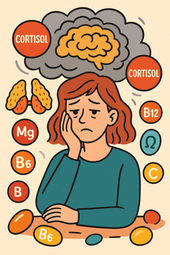
The Link Between Cortisol, Brain Fog, and Nutrient Deficiencies
When brain fog sets in, it’s not just in your head — it’s in your hormones. 🌿 Discover how cortisol imbalance and nutrient deficiencies like low magnesium, B vitamins, and omega-3s can cloud your focus and how restoring balance brings back mental clarity and calm. ✨
-
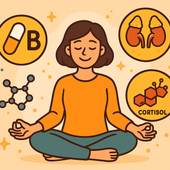
B Vitamins for Stress, Energy, and Cortisol Regulation
B vitamins are the foundation of stress resilience and steady energy. 🌿 Learn how this essential group of nutrients helps regulate cortisol, restore focus, and keep your nervous system calm — giving you balance from the inside out. ✨
-

Cortisol Imbalance and Chronic Fatigue: Can Supplements Help?
When chronic stress keeps cortisol high, fatigue and brain fog follow. 🌿 Learn how to rebalance your stress hormones naturally with calming nutrients, adaptogens, and lifestyle rituals that restore energy, focus, and inner peace. ✨
-

Adaptogen Stacks for Better Sleep and Lower Stress Hormones
Adaptogens can help your body recover from stress and sleep better by regulating key hormones like cortisol and adrenaline. 🌿 Learn how adaptogen stacks work to restore balance, calm the mind, and rebuild resilience — so you can rest deeply and wake renewed. ✨
-

Phosphatidylserine for Nighttime Cortisol Control
When stress hormones stay high at night, deep rest becomes impossible. 🌙 Discover how phosphatidylserine helps calm the brain, reduce nighttime cortisol, and restore healthy sleep rhythms — so you can wake up peaceful, clear, and recharged. ✨
-

Magnesium for Stress Relief and Cortisol Reduction
Magnesium is one of the most powerful natural tools for stress relief. 🌿 This essential mineral calms your nervous system, lowers cortisol, and helps your body recover from chronic tension. Learn how magnesium replenishes balance, improves sleep, and restores inner peace — naturally. ✨
-

Supplements to Improve Sleep by Balancing Cortisol
When cortisol stays high at night, sleep becomes a struggle. 🌙 Discover natural supplements that calm the nervous system, lower stress hormones, and restore your body’s natural rhythm. From magnesium and ashwagandha to L-theanine and phosphatidylserine, learn how to build deeper, more restorative rest. 🌿
-

Cortisol and Sleep: Why Stress Keeps You Awake
When stress keeps your body in fight-or-flight mode, cortisol refuses to calm down — and sleep becomes impossible. 🌙 Learn how elevated cortisol disrupts your circadian rhythm, suppresses melatonin, and turns restless nights into exhaustion. Discover how to restore balance and reclaim deep rest. ✨
-

L-Theanine for Cortisol Balance and Anxiety Relief
L-Theanine — the calming amino acid from green tea — helps quiet the mind and balance cortisol, the body’s key stress hormone. 🌿 Learn how it promotes calm focus, eases anxiety, and supports deep rest without sedation, backed by modern research and centuries of tradition. ✨
-

Rhodiola Rosea and Stress Resilience: A Natural Cortisol Regulator
Rhodiola rosea is one of nature’s most powerful tools for resilience. 🌿 This Arctic root helps balance cortisol, fight fatigue, and sharpen focus — keeping you calm yet energized even under stress. Discover the science behind Rhodiola’s adaptogenic power and how it helps your body thrive under pressure. ✨
-

Ashwagandha for Cortisol Balance: What the Science Says
Ashwagandha helps your body recover from chronic stress by calming the adrenal system and balancing cortisol — your key stress hormone. 🌿 Learn what science says about this powerful adaptogen, how it restores energy and focus, and why it’s one of nature’s most effective tools for modern stress relief. ✨
-

Supplements That Naturally Lower Cortisol Levels
When cortisol levels calm, your energy transforms — no more crashes or jitters, just steady focus and inner peace. 🌿 Learn which natural supplements and habits lower stress hormones, boost calm energy, and help your body thrive with balance instead of burnout. ✨
-

What Is Cortisol Imbalance? Symptoms You Shouldn’t Ignore
Cortisol — your body’s main stress hormone — keeps you alert and energized, but when it’s out of balance, it can drain your health. 🌿 Learn the signs of cortisol imbalance, from fatigue and anxiety to sleep disruption and stubborn weight gain, and discover how to restore calm, energy, and hormonal harmony naturally. ✨
-

The Best Daily Multivitamins for Menopausal Women
Menopause brings new nutritional needs that your old vitamin routine may no longer meet. 🌿 Discover how the right daily multivitamin can boost energy, balance mood, support bone and heart health, and keep your skin glowing. Learn which nutrients truly matter — from vitamin D to magnesium and B12 — to feel strong and vibrant every day. ✨
-

Antioxidants and Menopause: Fighting Inflammation Naturally
During menopause, oxidative stress and inflammation can quietly accelerate aging, fatigue, and skin changes. 🌿 Learn how antioxidants — from vitamins C and E to polyphenols in berries and green tea — help neutralize free radicals, reduce inflammation, and restore balance naturally. Discover the science of radiant, resilient aging. ✨
-

How CoQ10 Supports Heart Health After Menopause
After menopause, heart health becomes more important than ever. ❤️ Discover how CoQ10 — your body’s natural energy molecule — supports cardiovascular strength, restores vitality, and protects against oxidative stress. Learn how this essential nutrient helps keep your heart energized, balanced, and resilient through every stage of life. 🌿
-

Collagen Supplements for Skin and Joint Health Post-Menopause
After menopause, collagen loss affects both skin elasticity and joint comfort — but supplements can help rebuild from within. 🌸 Learn how collagen peptides, vitamin C, and other nutrients work together to restore firmness, reduce stiffness, and keep you glowing and mobile well into your next chapter. ✨
-

Calcium and Vitamin D: Protecting Bone Health in Menopause
Menopause brings hormonal changes that can weaken bones—but with the right nutrients, strength and stability can be rebuilt. 🦴 Learn how calcium and vitamin D work together to protect bone density, prevent fractures, and keep your body resilient. This guide explores nutrition, sunlight, and lifestyle habits that help your bones stay strong and vibrant for years to come. ☀️💪
-

Adaptogens for Energy and Resilience During Menopause
Feeling drained or emotionally scattered during menopause? 🌿 Discover how adaptogenic herbs like Ashwagandha, Rhodiola, and Ginseng can restore energy, balance cortisol, and build emotional resilience. Learn how these natural allies work with your body—not against it—to help you stay strong, focused, and calm through life’s hormonal changes. 🌸
-

Supplements That Help Beat Menopause Fatigue
Menopause fatigue can feel like more than tiredness—it’s a total energy crash. This guide explores how specific supplements, mindful breathwork, and therapy can help restore balance. Learn how nutrients like B vitamins, magnesium, and adaptogens rebuild your stamina, while breathwork and emotional healing calm your nervous system and bring vitality back to your days. 🌿✨
-

Herbal Blends for Menopausal Restlessness: Finding Calm in Transition
Herbal blends bring the wisdom of nature into moments of rest and renewal. Discover how soothing herbs like chamomile, lemon balm, and ashwagandha work together to calm menopausal restlessness, balance hormones, and invite deep relaxation. 🌿💫
-

Magnesium + Glycine for Deep Sleep During Menopause
Nutrients like magnesium, glycine, and B vitamins form the foundation for deep, restorative sleep during menopause. Discover how these natural compounds calm your nervous system, balance hormones, and help you wake up refreshed and recharged. 🌿💤
-

Melatonin and Menopause: Restoring Your Sleep Cycle
Nutrients are the foundation of hormone balance and energy. Learn how vitamins, minerals, and whole foods like greens, salmon, and berries nourish women’s bodies during menopause and beyond — restoring vitality, mood, and strength. 🌿🥗
-

How L-Theanine Helps With Menopausal Anxiety
Science continually deepens our understanding of the human body, from hormones to neurotransmitters. Discover how evidence-based research shapes modern wellness — bridging natural medicine, neuroscience, and hormone balance for healthier living. 🔬🌿
-

Can Ginkgo Biloba Improve Memory in Menopausal Women?
Hormone therapy can be a powerful tool for easing menopause symptoms and restoring balance. Learn how it works, the types available, and how to combine it safely with lifestyle and natural support for optimal well-being. 🌸💊
-

B Vitamins for Mental Clarity During Menopause
Nutrients are the foundation of mental and physical balance during menopause. Discover how vitamins, minerals, and whole foods like leafy greens, fish, nuts, and citrus can fuel energy, clarity, and calm while supporting hormonal health. 🌿✨
-

Mood Swings and Menopause: Natural Nutrient Support
Probiotics do more than support digestion — they help balance mood, hormones, and immunity too. Learn how a healthy gut microbiome can ease menopause symptoms, boost energy, and improve emotional resilience naturally. 🌿🦠
-

Brain Fog in Menopause: Supplements That May Help
Supplements can be powerful allies in restoring balance, energy, and focus—especially during menopause. Learn how nutrients like omega-3s, vitamin D, magnesium, and herbal adaptogens work together to support brain health, reduce stress, and promote lasting vitality. 🌿💊
-

Adaptogen Stacks for Reducing Night Sweats
Hormone detox isn’t about cleansing your body—it’s about restoring flow. Learn how the liver, gut, and endocrine systems work together to eliminate hormone buildup and how herbs like milk thistle, dandelion, and schisandra support balance, clarity, and natural vitality. 🌿💫
-

Cooling Menopause Symptoms with Herbal Support
Ashwagandha is one of nature’s most powerful adaptogens, helping women manage stress, sleep better, and balance hormones naturally. Discover how this ancient root supports calm energy, emotional resilience, and relief from menopause-related anxiety and fatigue. 🌿💫
-

Evening Primrose Oil and Menopause: What the Research Says
Hot flashes are one of the most common—and frustrating—symptoms of menopause. Discover what causes them, why the body’s “internal thermostat” becomes unbalanced, and the natural supplements and lifestyle shifts that can help you cool down, rest better, and feel more in control. 🔥💧
-

How Black Cohosh Helps with Menopausal Symptoms
Sleep disturbances are among the most exhausting symptoms of menopause—but they don’t have to rule your nights. Discover how natural strategies and calming supplements can help you fall asleep faster, stay asleep longer, and wake up feeling truly restored. 🌙💤
-

Natural Supplements That May Reduce Hot Flashes
Hot flashes can disrupt sleep, confidence, and daily comfort—but natural relief is possible. Discover the best research-backed supplements like black cohosh, red clover, and licorice root that may reduce hot flashes, balance hormones, and restore inner calm during menopause. 🌿💫
-

Omega-3s and Menopause: Supporting Mood and Inflammation
Omega-3 fatty acids are essential for hormonal harmony, brain function, and emotional balance—especially during menopause. Learn how these healthy fats reduce inflammation, support heart health, and restore calm, vitality, and focus through every stage of midlife. 🌊💫
-

The Role of Vitamin D in Menopausal Health
Vitamin D plays a powerful role in menopausal health—supporting bone strength, hormone balance, and mood stability. Discover how optimizing your vitamin D levels can improve sleep, energy, and emotional well-being while protecting long-term vitality through every stage of menopause. 🌞💪
-

Magnesium for Menopause: Relaxation, Sleep, and Hormonal Support
Self-regulation is the art of staying calm, centered, and in control—no matter what life throws your way. Learn how to strengthen emotional balance, manage stress responses, and cultivate inner peace through mindful techniques that reconnect your heart, body, and brain. 🌿💫
-

Can Adaptogens Like Ashwagandha Ease Menopausal Symptoms?
Brain fog during menopause can make even simple tasks feel overwhelming—but you’re not losing your sharpness, your hormones are simply shifting. Discover how adaptogens like ashwagandha and key nutrients can restore mental clarity, balance cortisol, and bring calm focus back to your day. 🌿🧠
-

Supplements That Support Hormonal Balance During Menopause
Herbal supplements have supported women’s health for centuries—and modern science is finally catching up. From ashwagandha and maca to red clover and rhodiola, discover how nature’s most trusted herbs can calm stress, balance hormones, and enhance energy through every life stage. 🌿✨
-

The Ultimate Motivation Stack: Supplements That Work Together
Discover how therapy helps restore motivation, focus, and emotional balance alongside supplement and mindset strategies. This empowering article explores how addressing thought patterns and emotional blocks through therapy can complement biochemical tools for long-term drive and well-being. 🧠💬
-

Entrepreneurial Drive: Can Supplements Help You Avoid Burnout?
Entrepreneurship demands energy, creativity, and mental resilience—but without balance, it leads to burnout. This in-depth article explores how nootropic supplements, adaptogens, and mindset tools can help entrepreneurs sustain motivation, manage stress, and keep their drive sharp for the long haul. 🚀💼
-

Supplements for Students: Staying Motivated Through Exams
Feeling burned out before finals? Discover how the right supplements can help students stay focused, calm, and motivated through exam season. This guide explores science-backed nutrients, brain-boosting herbs, and mindset tools that fuel clarity, memory, and stress resilience when it matters most. 🎓⚡
-

How Nootropic Stacks Can Enhance Drive and Focus Together
Discover how nootropic stacks can reignite both your drive and focus by balancing key neurotransmitters like dopamine and acetylcholine. This in-depth guide explores the science behind motivation, how supplements enhance cognitive performance, and how breathwork and therapy complete the picture for lasting mental clarity. 🧠✨


















































